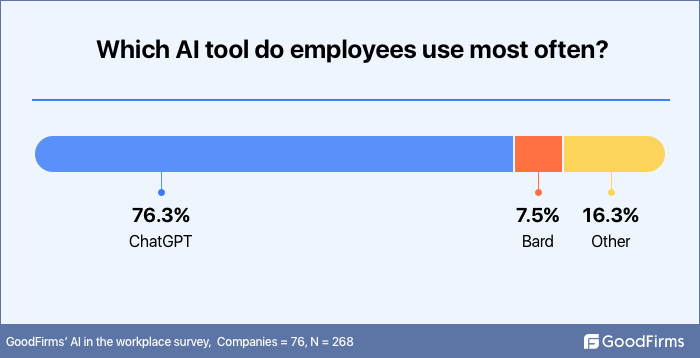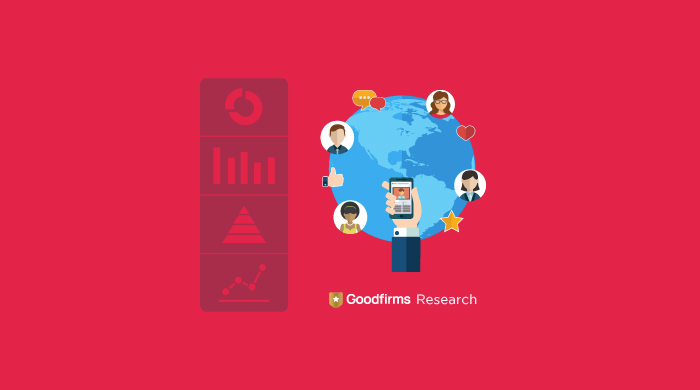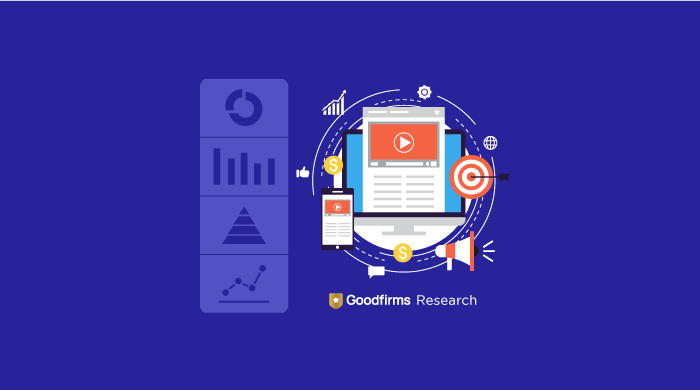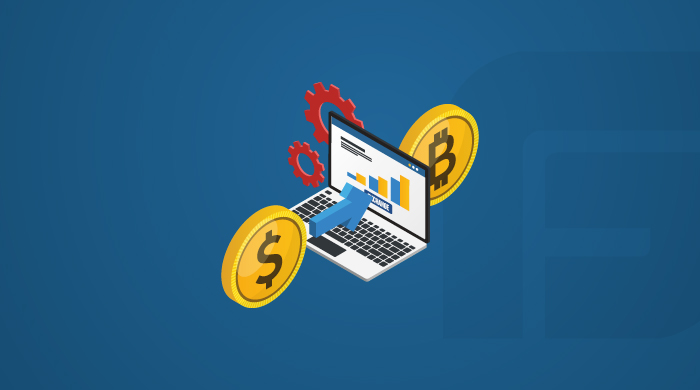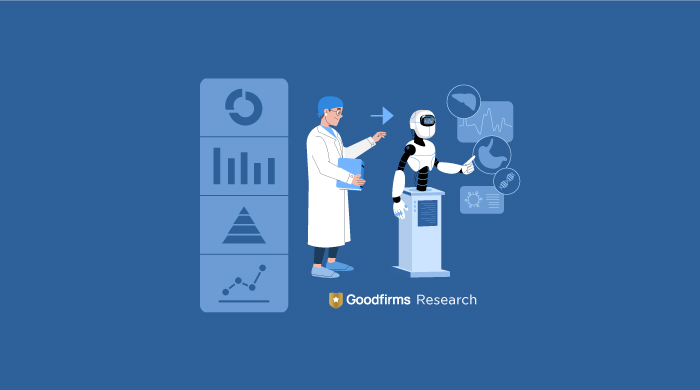Key Takeaways:
86.5% of employees surveyed reported using AI at work.
76% of Employees say they use ChatGPT over other tools, making it the most popular AI tool.
84.7% of AI users leverage AI tools ‘Everyday’ or a ‘few times a week’.
100% of Employees using AI tools reported AI improved their work’s quality.
Around 63% of employees using AI tools said they would want their employer to pay for the ChatGPT enterprise version.
Terms like AI and ChatGPT have skyrocketed in popularity over the last year, becoming household names and part of common speech across all demographics of the employed population. We are well aware of the prevalence, effectiveness, and impact of tools like ChatGPT, as well as the fact that AI tools are likely to grow in usage across the workplace.
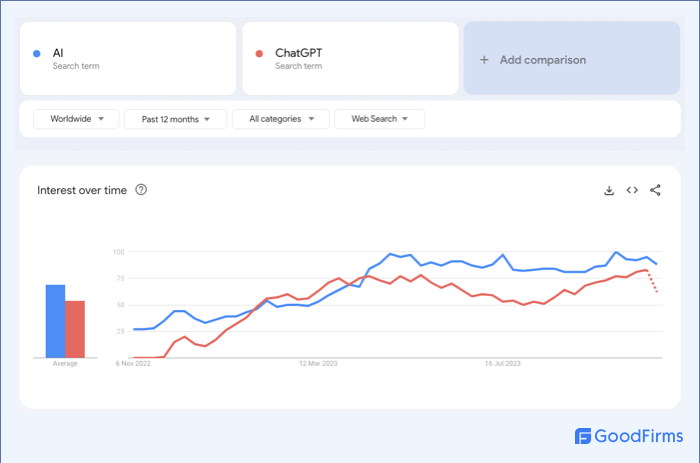
Source: Google Trends
The reason behind this meteoric rise is a never-seen-before promise of automation delivered by artificial intelligence companies that can potentially improve the average worker's efficiency by many folds. But no innovation exists devoid of its dangers. With an increasing dependence on AI, employees are forced to reinvent themselves in an AI-augmented world, prompting concerns and fears across the industry.
Our survey aims to investigate these urgent trends.
We've focused on a diverse group of workers and experts to help us build a comprehensive understanding of AI's impact on the contemporary workplace.
Read along to find out how employees are leveraging AI in the workplace to enhance their productivity, as well as dive deeper into understanding how, if at all, the upcoming wave of automation will affect the existing workforce.
Table of Contents:
Artificial Intelligence in the Workplace: Adoption and Usage
How are Employees using AI in the Workplace
-
76.3% of Employees use ChatGPT, Making it the Most Popular AI Tool at the Workplace
-
Who uses AI the Most? AI users split in terms of work experience
Department Specific Stats and Trends for AI usage in the Workplace
More Departments leveraging Artificial Intelligence in the Workplace
Top Reasons Why Workers Aren't Using AI at the Office
The Future of Artificial Intelligence in the Workplace
-
ChatGPT Enterprise version: Do employees want their companies to pay for it?
-
Safety, Trust and Privacy: Do You Trust OpenAI and Other AI Companies?
-
Transparency with AI Usage: Do Employees Care if Managers Know About Their AI Usage?
Methodology
We surveyed employees from more than 70 companies and spoke to experts leveraging AI across a wide range of industries.
We analyzed the quantitative data from our surveys statistically to identify broad patterns. Qualitative data from open-ended questions was studied thematically to extract insights. Qualitative inputs for industry experts and working professionals supplemented the trends identified based on our statistical analysis.
The result is a broad overview of AI being leveraged across various professional domains, especially in key areas like Marketing, Content Creation, and Software development.
AI in the workplace: Adoption and Usage
With the demographic breakdown of our survey out of the way, let's dive deep into the heart of the report. How are folks utilizing AI?
Using AI Tools for work-related tasks
Among the respondents, 86.7% of users reported using AI for day-to-day tasks at work, while 13.3% said they do not use AI at work.
Had this been any other technology, securing an 86% penetration within the workplace in such a short span of time would be nothing short of a miracle in the world of tech. Yet, with AI, the rapid and pervasive adoption is hardly a surprise.
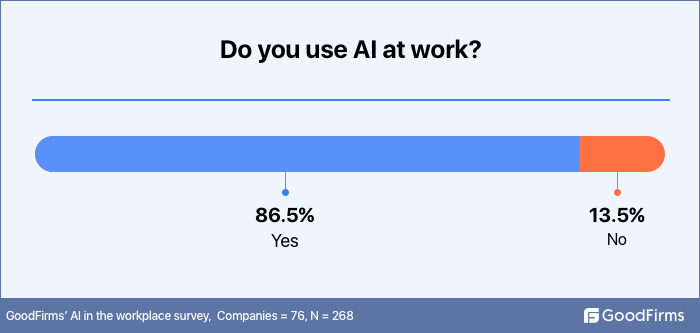
And such rapid adoption of AI in the workplace shouldn't be a surprise at all. Having an extra pair of hands doing some of the grunt work is a welcome change that most employees are eager to embrace.
That's also partly helped by how good some of these tools have gotten over time, both in terms of quality and accuracy.
On the question of AI tools in the workplace, Sudhir Khatwani, founder of The Money Mongers, summed it up best, stating, "Diving into the AI territory with ChatGPT has honestly been a breath of fresh air. I've got to say, it feels like we've got a new team member who's all about getting things done swiftly and without a fuss. I mean, looking down the road, I can totally see AI becoming the kind of colleague everyone wants - always on point, never tiring, and letting us humans focus on the stuff that really gets our creative juices flowing. It's like having an extra pair of hands that help us craft something really special."
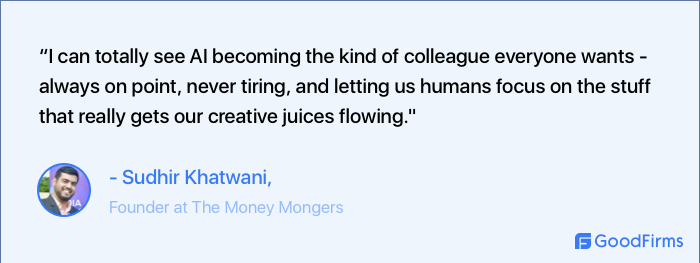
How are Employees using AI in the workplace?
We kicked off our investigation with some basic questions, trying to figure out which AI tool, among a plethora of those available, is the most popular among users. We also wanted to segment users based on their AI usage frequency and work experience. Below are the details.
76.3% of Employees use ChatGPT, Making it the Most Popular AI Tool in the workplace
Despite an influx of AI tools flooding the market, everyday users still prefer to use ChatGPT over other options. Countless similar reports have indicated a similar trend, further underscoring OpenAI's dominance and lead within the AI chatbot segment.
Google's Bard is another popular ChatGPT competitor, but its usage is capped at a mere 7.5% among our respondents. One interesting trend that popped up among Bard users was the specific task they were using AI for.
Most Bard users want to use AI for SEO optimization, and it seems they prefer Bard over ChatGPT for this purpose, perhaps because Bard is connected to the live internet and ChatGPT (free version) isn't.
Stephen Paul, product owner at JobTatkal, stated, "Well, not just ChatGPT, but Google's Bard and many other products that are currently facilitating us with our daily work and can 'revolutionize' the way our work is done. It has already made it quite easy for us to do some less important tasks, but the day isn't far when there is going to be a huge dependency on these products."
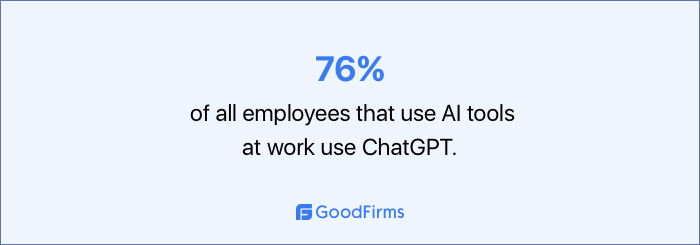
Who Uses AI the Most? AI Users Split in Terms of Work Experience
Splitting our surveyed demographic based on total work experience revealed something interesting. We noticed that employees on all levels use AI to some extent within their workflows.
My guess before looking into this data would have been that top-level executives do not utilize AI to the same extent as junior and mid-senior level employees do. That's because AI is more suitable for direct, straightforward tasks and less useful for jobs requiring complex thinking and decision-making.
But I was wrong. Turns out, everyone at the office is pro AI, juniors and seniors alike.
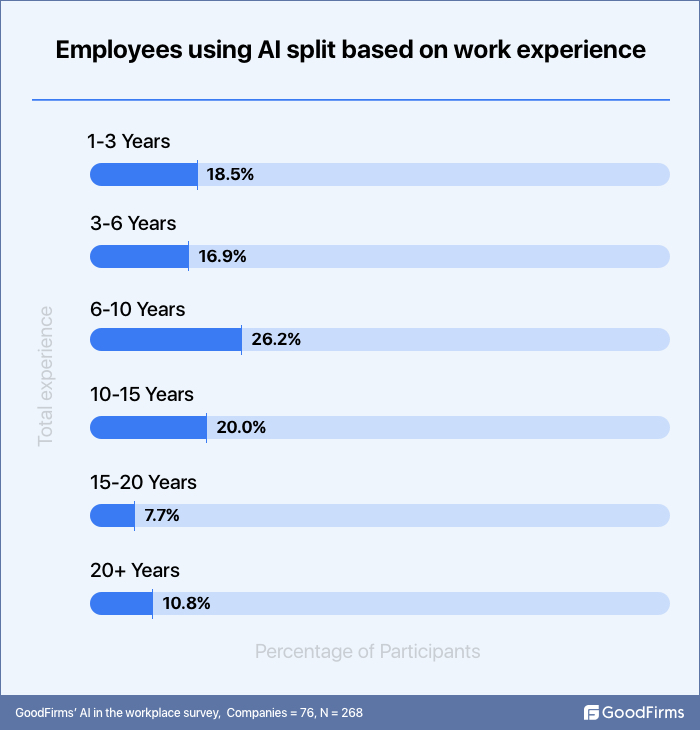
Our data showed that Junior, mid-senior, and Senior-level employees represented an even slice of the AI usage pie.
Juniors, falling in the 1-3 and 3-6 year brackets, comprised 35.4% of all participants.
Mid-seniors, folks with 6-10 and 10-15 years of experience, comprised 46.2% of our respondents.
And Seniors, people with 15-20+ years of experience under their belt, made up 18.5% of our surveyees.
Our data implies that employees on all levels within organizations use AI tools.
The reason why seniors represent a lesser percentage within our population isn't because they don't use AI as often but because there aren't as many senior employees (in our data and most organizations) as there are mid-senior or junior employees.
Most AI Users (46%) Use AI tools a Few Times a Week
Next up, we have usage frequency. Here is a split of how often folks use AI in the workplace:
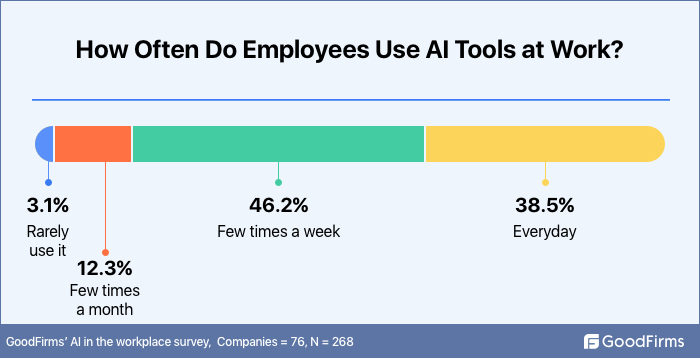
It turns out that a vast majority of employees who use ChatGPT or other AI tools at work use them either every day or at least a few times a week. Making AI use at the workplace almost a daily occurrence.
Take a moment to think about this. For an undisputed majority of workers (84%), AI today is on the verge of becoming as ubiquitous as technologies like email or instant messaging, at least in terms of usage frequency.
Certainly, none of us can imagine the future of work without emails or instant communication. Will we end up feeling the same for AI in the near future?
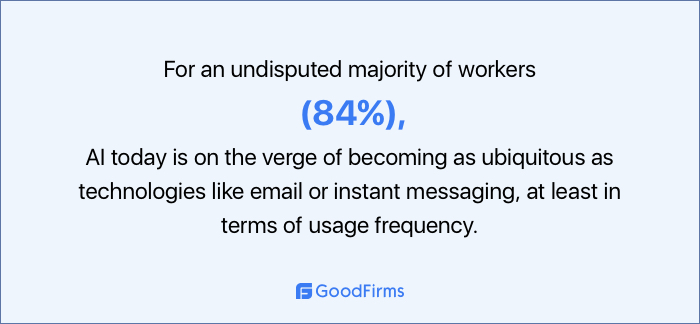
How Has Using AI Tools Affected Employee Work Quality?
Perhaps the most obvious but relevant question from our set. When asked if workplace AI usage had helped improve the quality of their work, our respondents unanimously agreed with the positive.
Yes, 100% of all AI users said that AI tools had improved the quality of their work.
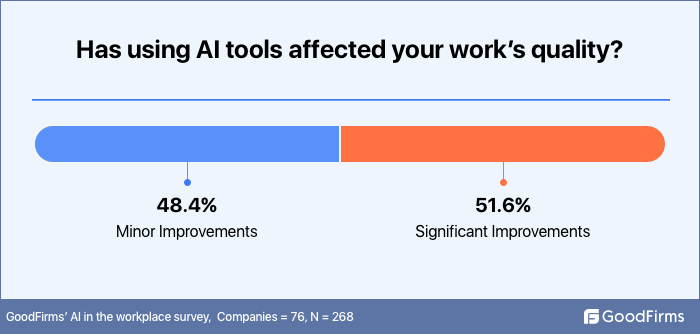
Among them, 51% reported that AI tools had 'significantly improved' their work, and 48% said they had seen 'minor improvements' within their work.
None of the participants in the survey responded with the remaining options that read 'No difference in work quality' and 'Work quality has declined.'
Which, in itself, is a noteworthy statistic.
How often do we come across technology that every adopter and user agrees to be worth their time?
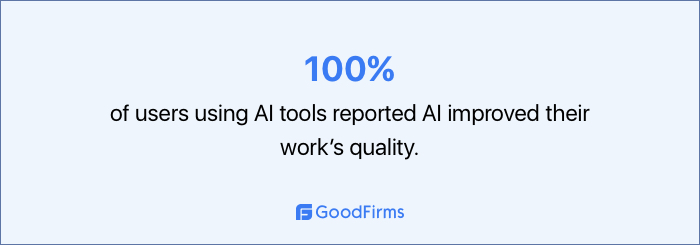
Department-Specific Stats and Trends for AI Usage in the Workplace
With the general trends out of the way, let's dive into department-specific trends and understand how employees are using AI across various departments. For this section of the study, we've chosen to focus predominantly on four major departments:
- Marketing
- Content production
- Software development
- Customer support
Part of the reason why we've chosen these particular departments is because the use of new-age AI tools is more pertinent within these realms, but also because we have the most relevant data from employees belonging to these teams.
AI Usage within Marketing departments
To understand how marketing employees are leveraging AI, we tried investigating what they use AI for and how effective AI tools are at achieving their goals.
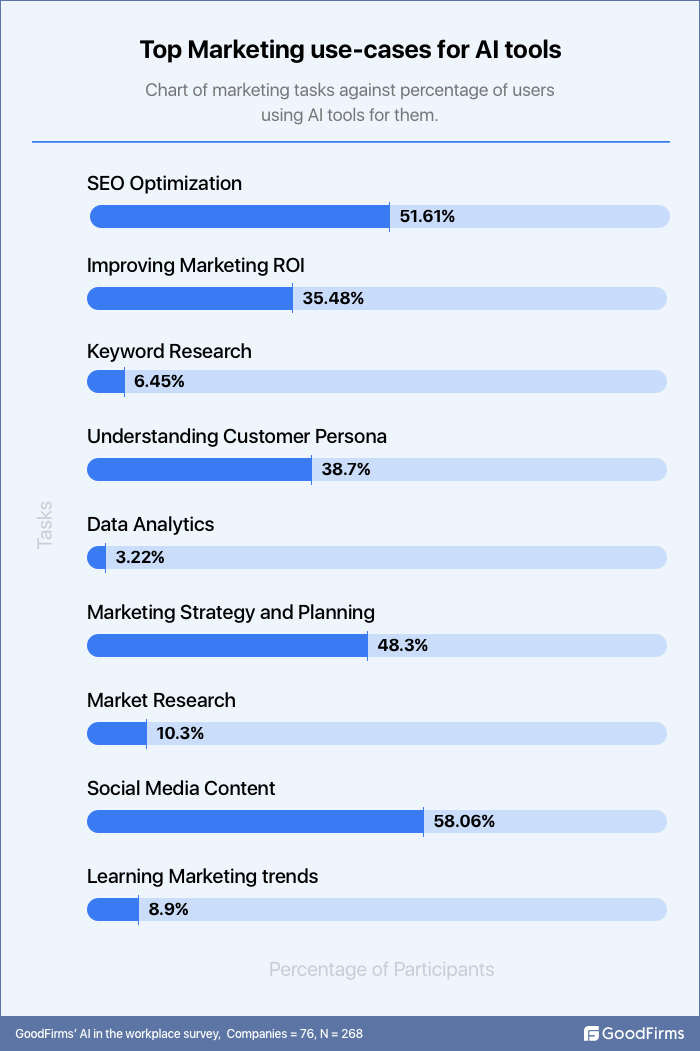
Surveying folks working within marketing departments revealed several insights. First, let's discuss these in terms of AI use cases:
- Around 52.94% of the respondents surveyed reported using AI tools for generating Social Media Content, making it AI's most popular use-case within Marketing Departments.
- Following close was Planning and Building Marketing Strategies, with 44.11% of respondents reporting they use AI for planning and strategizing.
- Next up, 41.17% of respondents reported using AI for SEO optimization, and 8.82% reported using AI tools for Keyword research.
- 29.41% of those surveyed use AI tools to improve their Marketing ROI.
As evident by the stats, AI has found multiple uses within the marketer's toolkit.
Creating Social Media content is typically a straightforward but time-consuming process. Marketers usually plan a month or at least a few week's worth of campaigns and content in advance, and it looks like AI is helping out with most of the leg work here.
A crucial part of this content creation process is ideation, which can partly explain why AI is being used in the planning and strategy side of things in a big way. I've seen examples of users creating multiple versions of the same content or messaging using AI to figure out the most effective/potent combination.
Many marketers set up AI tools like ChatGPT to act as certain user personas to better understand user needs and refine brand messaging.
Some of our experts reflected a similar trend of heavy adoption, explaining why AI in the workplace, especially within marketing teams, is a good fit.
One of them was Henry O'Loughlin from Buildreport, who stated, "The biggest areas I see [for AI adoption] are in a marketing department. In any given marketing project, you might have a writer, designer, developer, strategist, and analytics person. Pieces of each of those roles can now be done by AI. It will write the first draft for the writer. It will create 10 image options to choose from. It will build out the HTML or Javascript code to present the content. It might even plan the next marketing project." He added, "It feels like what happened to manufacturing jobs in the US in the 1970s is happening to desk jobs now. Lots of jobs got automated away and moved overseas in manufacturing. Tools like ChatGPT provide a similar leap forward in productivity because they can remove pieces of many desk jobs."
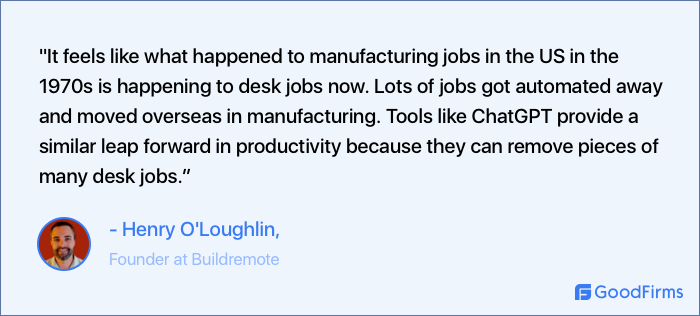
However, not everyone agrees with the technophile's creed that AI is here to replace us despite the growing adoption. Adding to the alternate side of the discussion Dominik Mąka, a decade-long SEO/SEM expert, explains, "Consider the SEO world for instance. Where we have repetitive tasks like data scraping, keyword tracking, and basic content optimization that AI can handle more efficiently. But, and it's a big but, the strategic and creative aspects of SEO, the understanding of cultural nuances when I'm working on a campaign for, say, a European market versus an Asian one, that's something inherently human. AI will augment our capabilities, not replace them."
Whether AI will replace the interns at a marketer's office still remains to be seen, but what's evident looking at the data is the fact that AI in the workplace has seen rapid adoption at multiple places of Marketing, and the trend is likely to accelerate further in the near future.
Effectiveness of AI Tools at Marketing Tasks
Higher adoption doesn't necessarily equate to great effectiveness. This is why we set out to figure out how effective these tools were at performing day-to-day marketing tasks.
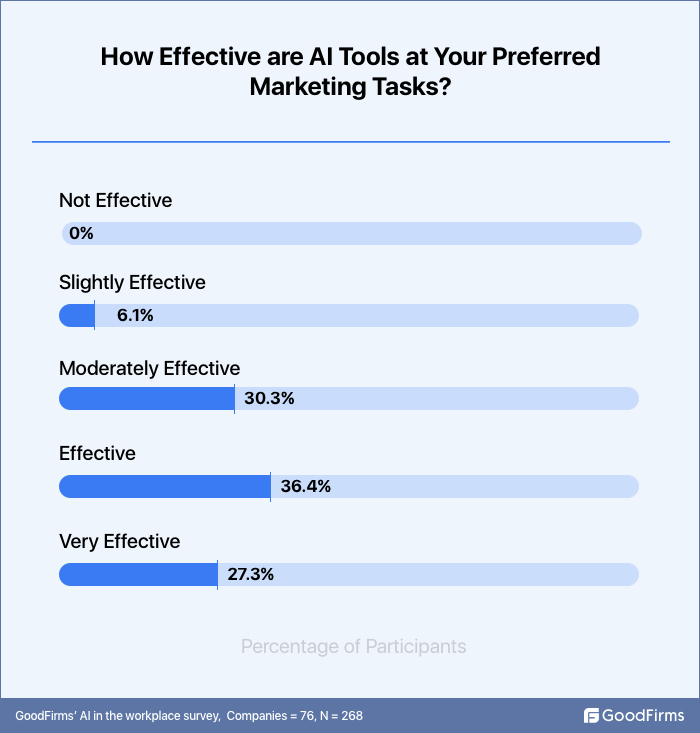
When prompted to talk about the effectiveness of AI tools at preferred marketing tasks, an overwhelming majority of users responded with a positive response.
On a scale of 1-5 (with 1 being not effective at all and 5 being very effective), around 30% stated that AI tools were 'Average' (rating 2/5) at their preferred marketing tasks, and more than 67% said AI tools were either good (rating 4/5) or very good (rating 5/5) at performing their preferred Marketing tasks.
Ease of Using AI Tools for Marketing Tasks
Further, we asked respondents to describe if it was complicated to use AI for their preferred tasks.
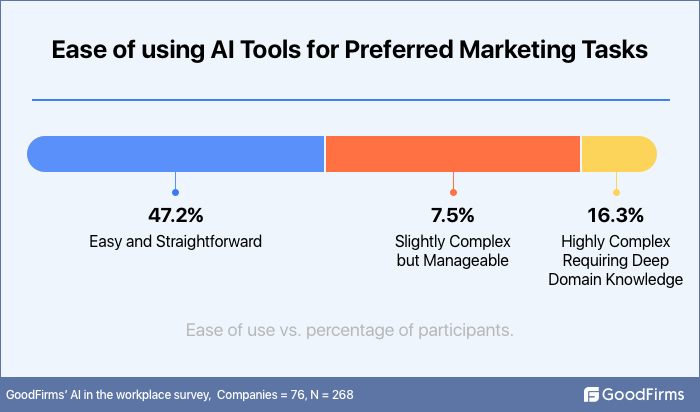
Only around 12.5% of those surveyed reported that using AI for their preferred marketing task was "highly complex and required deep domain knowledge."
40.5% and 47.1% of respondents reported that using AI was 'Easy to use and Straightforward' and 'Slightly complex but manageable'.
Considering these responses, it can be safe to conclude that employees using AI tools for marketing tasks do not require extensive editing, complex prompts, or deep domain understanding to achieve their preferred results. Such ease of usage is critical for AI in the workplace to become a relevant and lasting trend.
AI Usage within Content Departments
Next up, we focused on content marketers and content creators to understand how AI was enhancing their workflow:
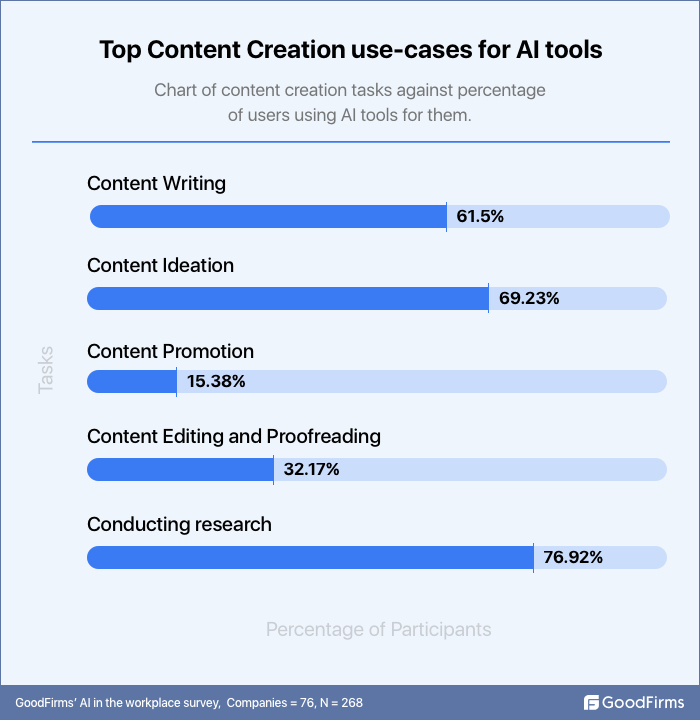
Three prominent use cases stood out when surveying content teams on their usage of AI tools: Content research, content ideation, and content writing.
- In total, 69.23% of participants using AI tools for content-related tasks reported using these tools to help out with Content ideation.
- 61.5% of respondents said they used AI tools to help out with writing content on their jobs.
- A staggering 76.92% of respondents reported using AI tools for conducting content research.
- And a mere 15.38% of respondents said they used AI for proofreading and editing their content.
Experts backed up our findings by confirming that they've been using AI for similar content-creation tasks within their organizations.
Content creation is undoubtedly the biggest avenue where AI technologies have found the most applications in recent times.
And not just content creation itself, experts agreed with our data point on AI being heavily utilized for content research. Patricio Paucar, co-founder of Navi, stated, "AI won't solve every problem in the workforce, but it will be instrumental in creating efficiencies and performing repetitive tasks people don't want to do. One area that's being widely used already is utilizing ChatGPT in research. This applies to many industries and can reduce the time spent looking up facts or gathering important insights. There's no doubt that ChatGPT will eliminate some jobs, but it is also creating new job paths every day."
Beyond Content research, experts like Olivia Langford, Senior editor at NY Crossword Today reported using AI tools for editing and proofreading as well, "AI can help us analyze user preferences and create [products] tailored to their skill levels and interests, providing a more engaging experience. Additionally, we're exploring AI's potential in automating the proofreading and fact-checking processes to ensure the accuracy and integrity of our content."
Anna Rubkiewicz, co-founder at Contentki, had an interesting take on using AI tools for producing content. She underscored the unspoken concerns shared by all marketers as well as provided advice on staying relevant in an AI-dominated world, "As a content marketing business owner, I must admit that I was initially reluctant towards AI's research capabilities…..I must say that I underestimated its role…..To stand a chance against these types of technologies, people need to prioritize uniqueness and quality, and constantly ask themselves – "what assets do I, a human being, have access to in the real world that AI does not?". That said, we need to think of AI as a helper, not a threat. The key is to maintain balance."
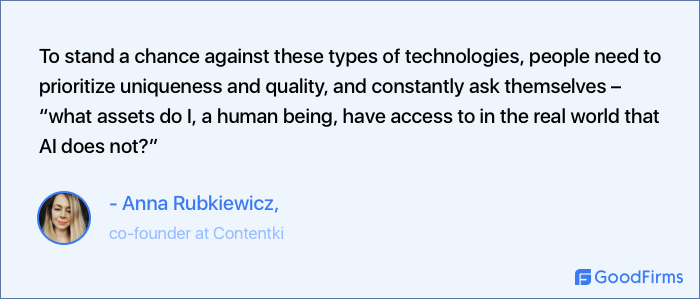
Despite steady growth in adoption and usage, Companies and content marketers alike are realizing that AI tools are still a long mile from replacing real human creativity.
Marketing expert and entrepreneur Kevin Miller conducted a study on writers, revealing some interesting insights, "Early this year, we experimented with creating content using AI tools like ChatGPT and Jasper. Over six weeks, we selected a small group of writers to experiment with the AI tools to increase workflow efficiency by up to 400%. …. We concluded that tools like ChatGPT could improve writing efficiency by 200% for research and content template creation but were unreliable for content creation and writing. The best it did for our workflows was to save keystrokes. Unfortunately, the technology isn't at the point where it can replace human writing or ingenuity."
Jason Smit, CEO of Contentellect echoed a similar, human-centric approach as he stated, "We recognize that personalized dynamic content at scale is an exciting opportunity with AI generation. We believe in crafting customized messaging while still being extremely cost-effective, but only with responsible implementation in mind. We want to enhance human creativity and strategy rather than replace it, our talented team will always be central in any future plans involving this technology."
Effectiveness of AI Tools at Content Development Tasks
When asked about how effective chatGPT and other AI tools were at performing content-related tasks, around 52% of our respondents reported that the tools were either 'Good' (rating 4/5) or 'Very Good' (rating 5/5) at performing their preferred tasks.
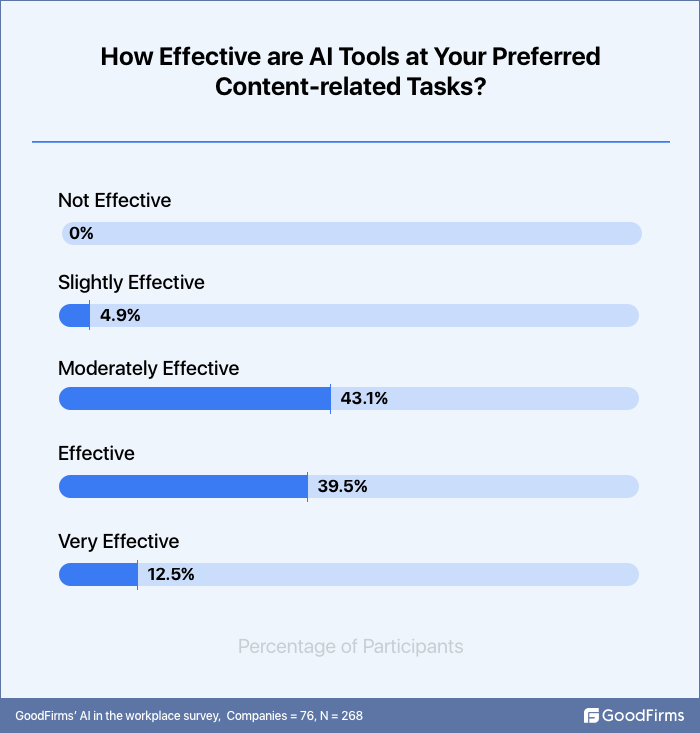
Another 49.3% reported that their tools of choice were 'Average' (rating 3/5) at performing the required content tasks. Only a mere 4.9% of respondents reported AI tools to be 'Bad' (rating 2/5) at performing content marketing tasks, and no one responded saying these tools were 'Very bad.'
Ease of Using AI Tools for Content Development Tasks
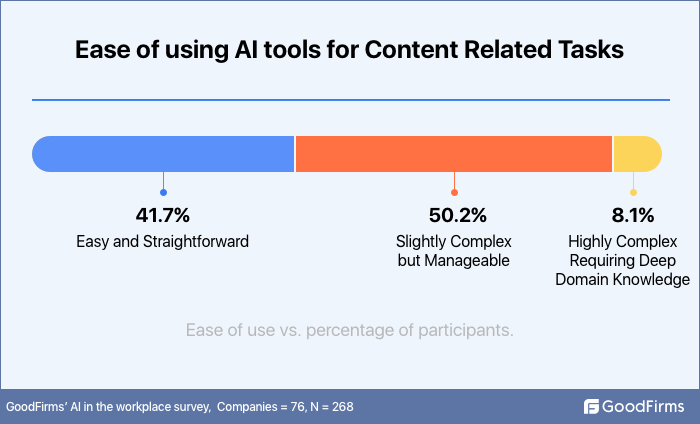
Around 50% of respondents reported that using AI tools for their everyday content-related tasks was 'Slightly complex but manageable,' and another 41% said it was 'Easy and straightforward.' Only a mere 8.3% of respondents using AI tools for content-related tasks reported that using AI to perform the jobs they needed was 'Highly complex and required deep domain knowledge.'
AI Usage within Software Development Departments
Moving beyond Marketing departments, let's now take a deep dive into how programmers and software developers are using AI. Here are the insights:
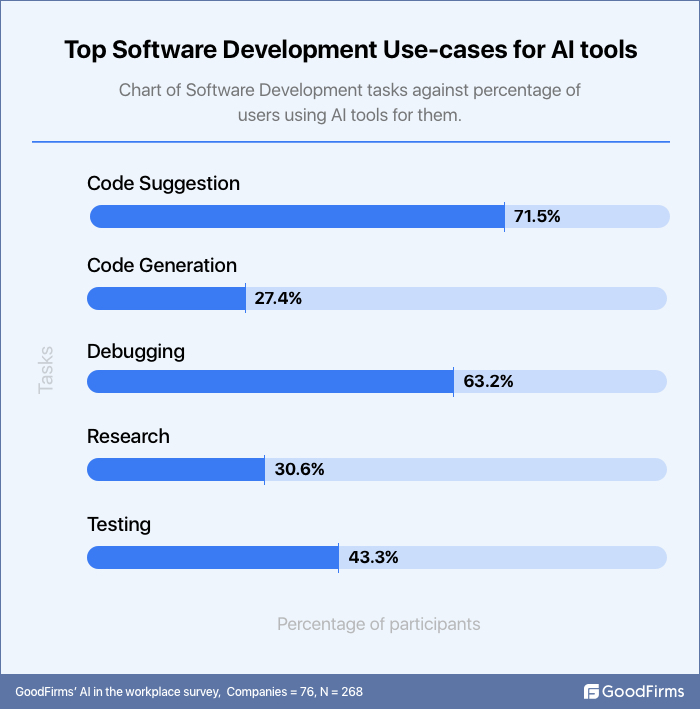
AI usage for software development is significantly different from AI usage for marketing or software development. The top ways in which software developers are using AI are Code suggestion, Code generation, and Bug fixing. Here is a detailed breakdown:
- Around 72% of the developers surveyed stated that they use some form of AI suggestions (from tools like Github Copilot) to speed up their development workflow. Note here that devs may not actively need to interact with a dedicated AI tool for this; a lot of these smart AI assistants are built within some popular IDEs, making AI super accessible for software devs.
- Around 63% of our respondents reported using AI for bug fixing and Debugging. While the effectiveness of such tasks isn't very high, it doesn't take much effort to copy-paste an error message within ChatGPT to get a brief overview of the situation.
- Another 43% of surveyees reported using AI tools for testing code snippets before implementing them into high-stakes projects.
- Finally, 27% and 31% of developers use AI tools for code generation and research, respectively.
Daniel Daines-Hutt, head of content at Zero To Mastery, reached out to us, stating they carried out a similar survey, which revealed much of the same overlapping trends. He stated, "84.4% of the programmers surveyed have some level of experience with AI tools. The top 5 are: ChatGPT (3.5 and 4), GitHub CoPilot, Midjourney, Visual Studio IntelliCode, and Bard."
"80.5% of programmers are using these tools as a search engine for new topics, while 58.5% are actually using them to help write code."
"36.6% stated that the biggest thing preventing them from using AI tools is simply the learning curve and figuring out how to use them effectively. There were a few other reasons but this was the biggest holdup. 14.6% were also concerned with the time required to learn and 13.4% were worried about the accuracy of these tools."
Among popular AI tools for programming and software development, ChatGPT and Github Copilot stand out as the most popular.
José Moya, Outreach Manager at Capicua Full Stack Creative Hub, elaborated how he uses these two tools for separate but specific tasks stating,
"I frequently utilize AI tools like ChatGPT and GitHub Copilot in my software development tasks.
I find ChatGPT incredibly useful for generating code snippets, providing quick insights, and brainstorming solutions to coding challenges. Its natural language processing capabilities facilitate effective communication, making it a valuable companion for problem-solving.
On the other hand, GitHub Copilot is instrumental in streamlining the coding process. It helps auto-generate code, suggest functions, and complete repetitive tasks, significantly boosting productivity. I find it particularly handy for studies involving redundant boilerplate code or when I need to prototype and iterate quickly. Both tools have become integral parts of my workflow, enhancing efficiency and allowing me to focus on software development's more creative and strategic aspects."
Speaking of utilizing AI generate code, John Pennypacker from DeepCognition shared a few best practices to ensure maximum safety and effectiveness [Paraphrased]:
- The code must align with the project's requirements and adhere to best coding practices without introducing any vulnerabilities or security risks.
- AI-generated code must undergo extensive testing within a controlled environment, checking for bugs, compatibility issues, and performance concerns.
- Static code analysis tools and security scanning should be employed to validate that the AI-generated code does not contain vulnerabilities such as SQL injection or cross-site scripting (XSS) attacks.
- The maintainability and documentation of the code snippet must be assessed to determine if it is well-documented and understandable by the team to modify it if necessary in the future.
- Version control systems like Git should be used to manage changes, especially when integrating external code snippets. This way, modifications can be tracked, and previous versions can be easily reverted if issues arise.
Effectiveness of AI tools at Software Development tasks
Once again, much like what we saw with content and marketing departments, the effectiveness of using AI tools for marketing purposes has remained on the average/higher side. Around 53% of developers surveyed stated that they find AI tools to be 'Average' (rating ⅗) at performing their preferred software development tasks. This was followed closely by another 36% that believed AI tools were 'good' (rating ⅘ ) at performing software development tasks.
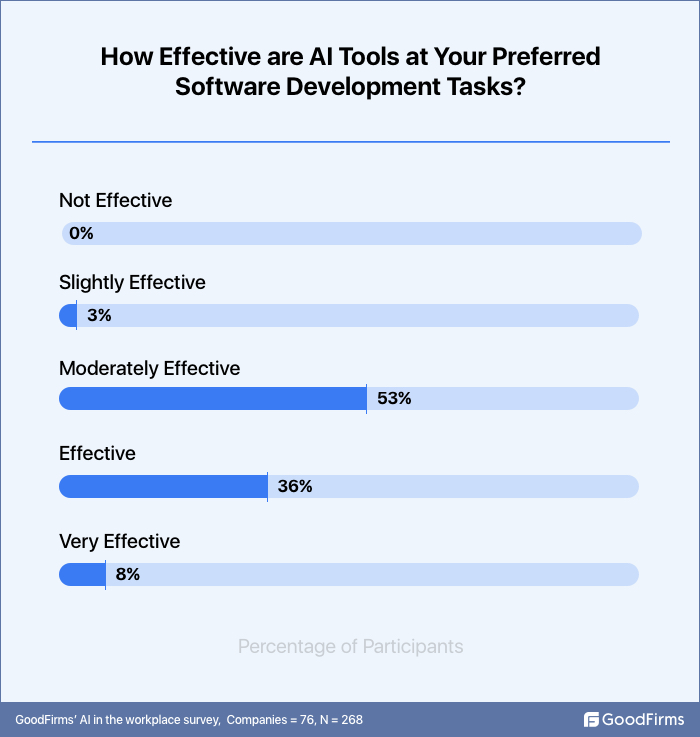
Taskade co-founder John Xie summed up AI's effectiveness at performing software development tasks perfectly, stating, "AI tools are usually very effective for our software development needs, though it mostly comes down to this: they either work flawlessly or don't work at all for any particular task."
This hit-or-miss nature of AI is precisely why software devs believe AI to be, on average, less effective at their preferred task as compared to, say, marketing professionals.
Ease of Using AI Tools for Software Development
Here is where we begin to notice differences between AI usage for software development versus AI usage for Marketing and Content development.
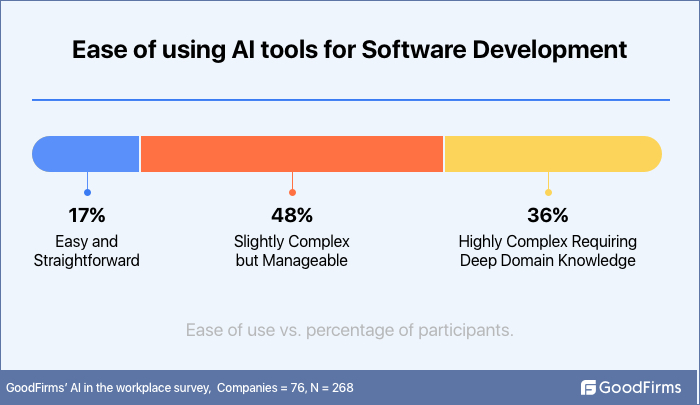
While the majority of marketing and content team users thought using AI for their preferred tasks was easy or only slightly complex, software developers believed using AI for their preferred tasks was either slightly or highly complex (48% and 36%, respectively.)
This shouldn't come as a surprise since it takes a seasoned developer to be able to tell if a code suggestion or debugging advice is accurate and reliable. With marketing tasks, much of the output is in the form of natural language, which is easy to judge, but judging code requires a basic level of domain knowledge and experience, which makes using AI in the workplace for software development slightly complex.
Debbie Chew, Global SEO manager for Dialpad clarified the same, "The ease or complexity of using AI for programming tasks depends on the task itself. For routine coding tasks, AI can simplify and streamline the process with minimal effort. However, for more complex challenges that involve natural language or intricate logic, it may require a deeper level of engagement, including writing complex prompts and fine-tuning responses to achieve the desired outcome."
AI Usage Within Customer Support Departments
And finally, let's take a look at how folks within customer support departments utilize AI tools.
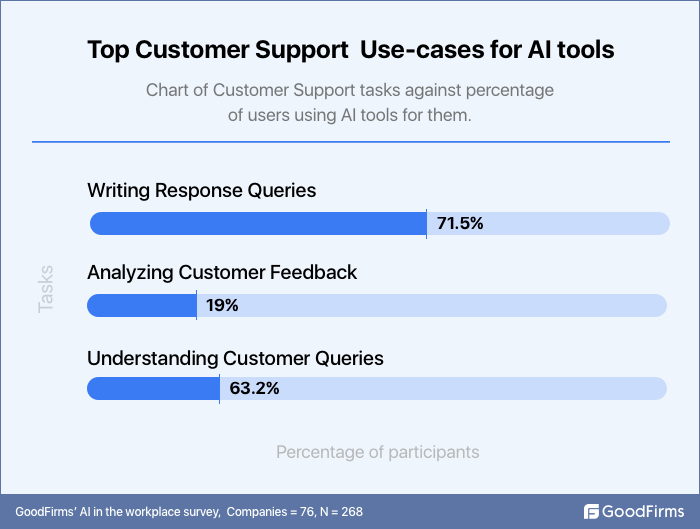
Customer Support use cases for AI are fairly limited, but the effectiveness for these is comparably high.
- Respondents reported that the most popular customer support use case for AI tools was drafting response queries, with 58% of respondents reporting they use AI tools for the same.
- Another 19% and 23% of respondents reported using AI tools for analyzing customer feedback and understanding customer queries, respectively.
Derrick Hathaway, Sales Director at VEM-Medical, stated that AI has played a significant role in improving their customer support pipeline, "At VEM Medicals, we are excited to leverage AI, including ChatGPT, for enhancing customer support. We see AI's potential in improving response times and providing quick, accurate solutions to common inquiries. This allows our human support agents to focus on more complex and value-added interactions, ensuring customers receive efficient and effective assistance while streamlining our support operations."
Matt Little, Co-owner at Damien Mcevoy, stated their desire to implement AI-enabled customer service as well, "Integration of AI tools will be essential as businesses adjust to the ever-evolving technology landscape. They can automate routine tasks, allowing human workers to concentrate on more complex and innovative lessons. However, it's important to note that AI should be seen as a supplement to human capabilities, not a substitute …..We're interested in how AI can help make our customers' lives easier. We're looking into AI chatbots that can help our clients quickly troubleshoot small problems or schedule appointments. Not only does this make our customers happier, but it also means our team can focus on more specialized jobs that require their skills."
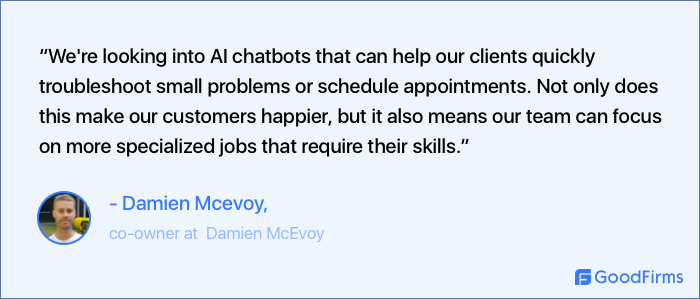
Effectiveness of AI tools at Customer Support tasks
Here is where we notice the maximum effectiveness of AI tools across all tasks and departments as measured within our survey. I believe this can be attributed to the fact that most tools like ChatGPT are designed to support a conversational, question-answer format.
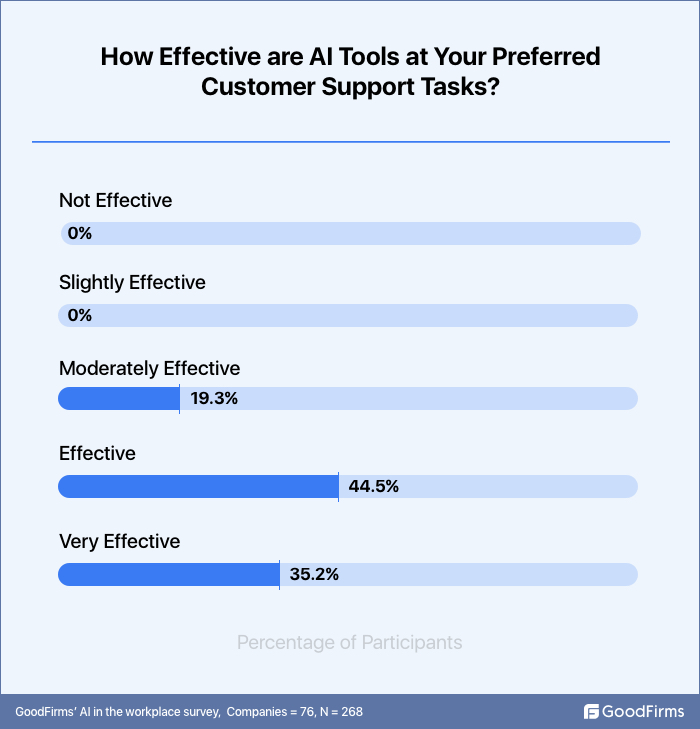
Simply on a UI level, these tools work very similarly to how a customer support operative interacts with users in real-time. This gives chatbots a great advantage when it comes to helping out with customer support, making AI tools for the same most effective.
Ease of using AI tools for Customer Support
As discussed above, popular tools like ChatGPT are built on a conversational format, making them very user-friendly and effective at customer support tasks.
37% of our survey respondents noted that Using AI tools for customer support tasks was 'easy and straightforward,' while 49% reported that it was 'slightly complex but manageable.' Only 17% felt that using AI tools was complex when performing customer support tasks, making AI in the workplace for customer support a no-brainer.
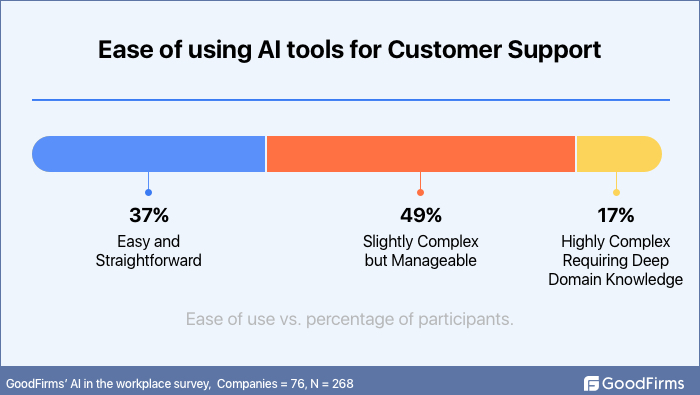
More Departments Leveraging Artificial Intelligence in the Workplace
While it's good to discuss how AI is specifically being leveraged in certain departments to better understand the nuances and implications of those applications, we must not forget that AI and tools like ChatGPT are designed to be general-purpose assistants and not fine-tuned to serve within certain departments doing specific tasks.
What this implies is that AI could be used for a wide variety of tasks across the organization, provided the user is smart enough to leverage the tool for tasks and purposes that may not initially appear to benefit from some AI help.
One good example of this came in via Damian Wasserman, co-founder at BEON.tech, who stated that they've been using AI tools to streamline their Hiring process. "In my opinion, AI tools in general will help people in their work as a copilot, helping us complete day-to-day and/or repetitive tasks, giving us insights, and helping us to be more productive and make better decisions. Our company is super excited about integrating AI into our daily tasks, for example, AI-assisted CV parsing provides deeper insights into candidate qualifications swiftly and AI-driven interview analysis simplifies the extraction of key points from technical conversations, among other things."
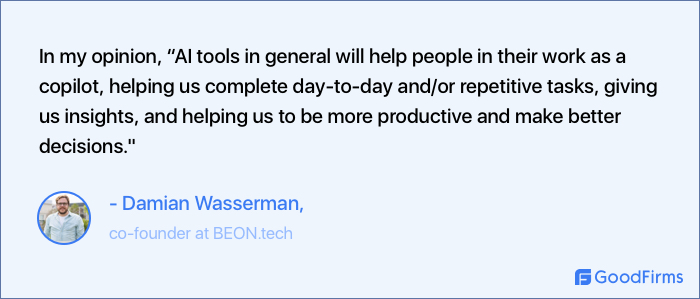
Another unconventional AI application came from Ian Wright, managing director at Business Financing. He stated, "In the finance industry accuracy is non-negotiable. This is where AI will transform the future of work, but reducing the human element's chance of error. For example, in the finance sector we can use AI to take a customer's loan application, assess all their history and lending criteria and predict if they are viable to be lent to in a matter of seconds."
While these applications are novel and promising, I do believe that some of these may require customized and more powerful AI solutions as opposed to the straight out-of-the-box AI tools that we've been focusing on. Nonetheless, understanding the role AI will be playing across multiple industries and applications is paramount to creating successful businesses in the near future.
But if AI is this good, what about the folks not using it?
Before diving deep into how AI is being leveraged at the workplace, let's take a moment to figure out why the 13% that do not use AI are leaving perhaps the biggest exploit of their careers on the table.
Top Reasons Why Workers Aren't Using AI at the Office
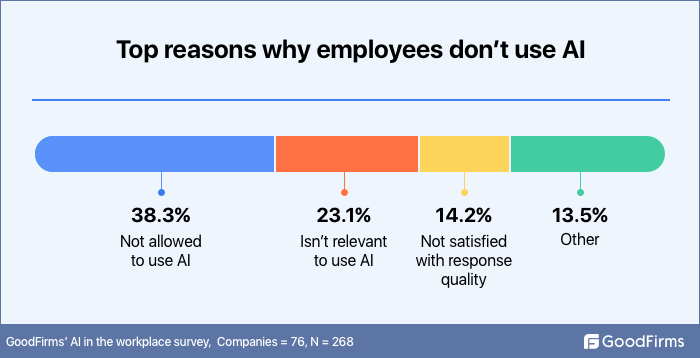
By far, the number one reason behind employees not using AI at work is the fact that their employers don't allow them to. While these are still scarce, it won't be a stretch to believe that some companies aren't on board with the idea of using AI. There could be numerous reasons fueling their hesitation.
Ray Fernandez, financial editor from Bizreport, explained why this could be the case, stating, "Some companies are still weighing out the risks of using ChatGPT against its benefits. As with any new technology that has disruptive power, certain caution is needed. However, many business leaders still feel that the ethical, reputation damages, and privacy and security risks outweigh the benefits."
A ton of variables and uncertainties, from a lack of regulations to AI models hallucinating and data privacy concerns, have given companies a good reason to hold back from heading into uncharted AI territory.
A small minority of non-AI users also cited reasons like the output not being relevant to their required task and the quality of the output not being up to the mark. While these were only reported by a very tiny fraction of the respondents, it is worth noting that these reasons occasionally do come up.
Would You Use AI Tools at Work in the Near Future?
When those that didn't use AI were asked if they would be open to using AI in the future, 66% of the respondents reported that they were unsure but open to the possibility of using these tools in the future.
While 11% said yes to using AI in the future for work-related purposes and 22% said no.
That was it for the 13% that didn't use AI.
The Future of Artificial Intelligence in the Workplace
Before wrapping up, we had a few more questions for our respondents to gauge their preferences and opinions on the future of ChatGPT in the workplace. This is an attempt to understand user opinion and their sentiments towards AI in the workplace.
ChatGPT Enterprise version: Do employees want their companies to pay for it?
OpenAI recently released a new enterprise version tailored towards corporations, specifically addressing some security and data protection concerns we reflected above.
We asked our respondents if they would want their employer to pay for ChatGPT enterprise, and around 63% of them said "Yes".
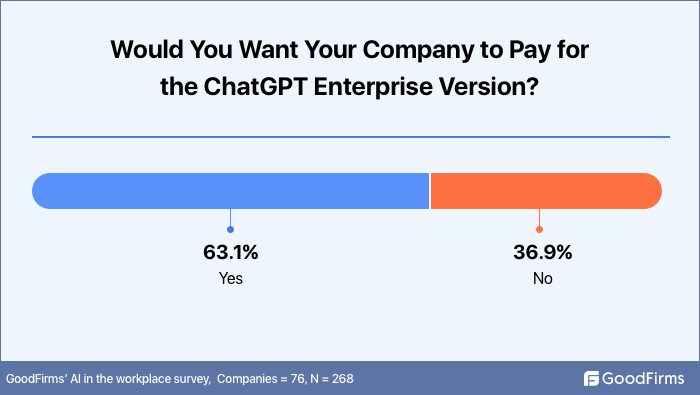
OpenAI claims the ChatGPT Enterprise version is twice as fast without any usage caps. It also provides unlimited access to advanced data analytics and can process four times larger files or inputs.
Considering the significant upgrade the enterprise version brings to the table and the fact that 86% of employees already use AI tools on a regular basis, the case for companies investing in the enterprise version is looking very promising.
Add to that the fact that every employee who uses AI tools has stated that AI has improved their output & performance, and ChatGPT really begins to feel like a no-brainer for companies looking for an AI advantage.
Safety, Trust, and Privacy: Do You Trust OpenAI and Other AI Companies?
We asked our respondents if they trusted ChatGPT, OpenAI, or the other major AI companies and tools with their company's data.
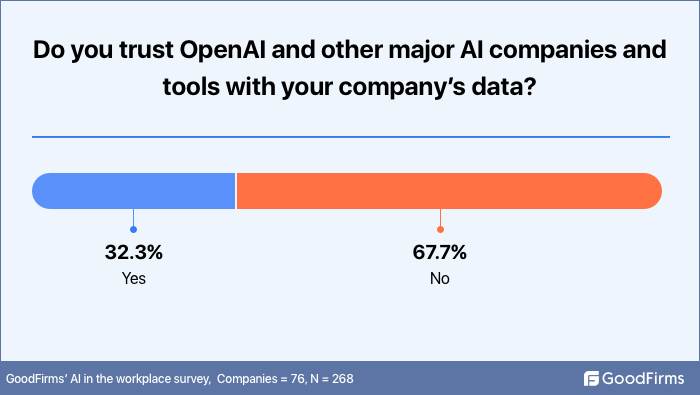
Once again, around 67% of respondents said they didn't, making it clear that a lack of trust around data security and privacy could be one of the biggest hurdles for AI adoption within the workplace.
Transparency with AI Usage: Do Employees Care if Managers Know About Their AI Usage?
We asked respondents if they were comfortable with their managers knowing about their AI usage.
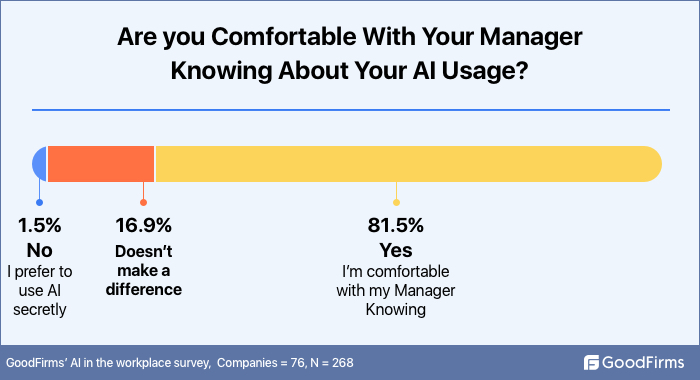
More than 81% of them said “Yes” while 16.9% of them said “It didn’t make a difference.”
Do Employees Fear if AI is Here to Replace Them?
Finally, we concluded the study by asking our respondents if they feared being replaced by someone potentially more proficient at using these AI tools. A majority of surveyees, around 69.2%, said "No," while only 12.3% said "Yes." The remaining 18.5% stated they "Haven't considered this possibility."
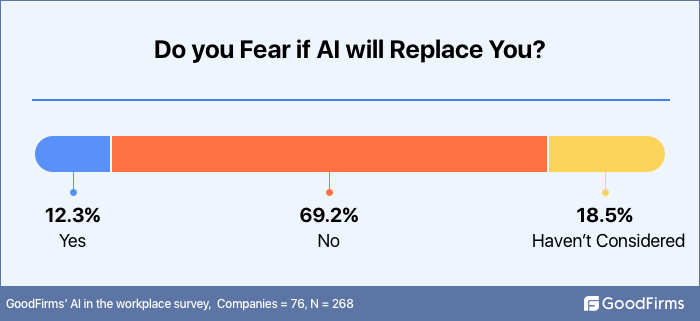
Will AI Replace Human Workers?
On the topic of replacing humans with machines, as mentioned in the earlier sections of the report, most of the experts we interviewed were against the idea of entirely replacing human workers with AI tools. The popular consensus remained that AI will augment and improve human potential and output instead of outright replacing it.
There is no denying that ChatGPT has ushered in a new paradigm of productivity that is likely to transform how we work and what is expected of us.
Brett Wharton, owner of NexusMKTG warns us about what these new expectations could look like, "ChatGPT challenges all of us to increase our job skills and productivity. Now, it's no longer enough to turn in passable code that ChatGPT could put together. Instead, we need to produce results that ChatGPT couldn't easily do. In writing, that means producing text that goes beyond the generic, whether that means using newer information, or putting ideas together in more novel ways."
Vaibhav Kakkar, CEO and Founder of DigitalWebSolutions, noted along similar lines, "However, while AI can augment and optimize many job roles, it may also replace certain specific tasks that are rule-based and repetitive, such as data entry, basic customer support, and some aspects of data analysis. It's essential for individuals to adapt by acquiring skills that complement AI, such as critical thinking, creativity, and emotional intelligence, to remain valuable in the evolving job market."
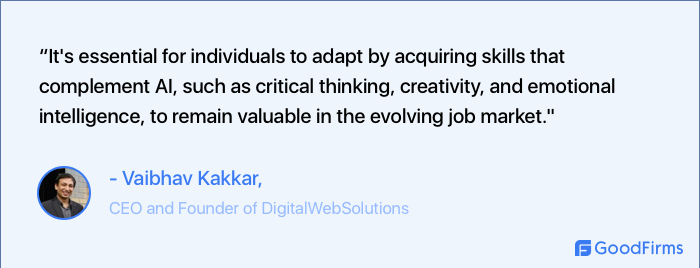
As users continue to develop more specialized skill sets, AI usage within the workplace will continue to rise, leading to significantly more productivity and output. With improved productivity, one worker will be able to work on the tasks of 3-4 employees in the near future if AI goes mainstream.
Blake Burch, co-founder and CEO of Shipyard stated, "I don't believe that jobs will be replaced by AI. Instead, I think we'll see such strong productivity gains that those using AI will far outpace those not using it. This will likely look more like role consolidation. For example, many businesses right now have a data engineer, an analytics engineer, a data analyst, and a business intelligence developer all working together to ingest, clean, and use data. In the near future, businesses may be able to have one data generalist that accomplishes the tasks of all of these roles by using AI."
But increased productivity and job consolidation aren't all that there is to the AI revolution.
In fact, the argument for AI in the workplace is often split into two parts.
First, there is the bit we already discussed, that AI is here to augment and improve our existing job roles. But second, and perhaps more importantly, AI is also here to create new jobs.
Speaking along these lines, Ewen Finser, founder of The Digital Merchant, stated, "As AI technologies like ChatGPT continue to advance, there's going to be a growing demand for people who can design, develop, and maintain these systems. These could be AI trainers, data annotators, and AI ethicists. These are roles that didn't even exist a decade ago, but they're becoming crucial in the AI-driven world we're entering."
Mike Sadowski, CEO at Brand24, added, "In my view, the rise of AI technologies, including ChatGPT, represents a generational revolution, akin to the birth of the internet. The ability to craft queries to AI tools effectively will become one of the most sought-after skills in the job market in the coming years. It's not just about cost-cutting or automation; it's about enhancing human capabilities, allowing us to focus on the more creative and strategic aspects of our roles."
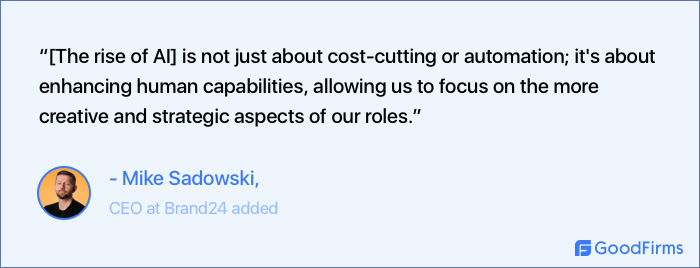
Venturing into an AI-driven World
Our study so far has uncovered tremendously valuable data about AI usage in the workplace. While one could debate over the finer details and future trajectories of these trends, it is clear without a doubt that AI is here to stay, especially in our offices.
Leading Artificial Intelligence companies have ensured that AI in the workplace isn't a mere trend but a paradigm shift within how we work and what we are capable of achieving. Consequently, AI adoption at the workplace is poised to grow, especially aided by the launch of dedicated services like ChatGPT enterprise version.
Based on the data and responses we received, it appears that AI is more likely to enhance the average worker than replace it. However, the change will require employees to shift into more productive—and sometimes new—AI-powered roles that can be fast-paced and dynamic.
Regardless of the outcome, the transformation seems inevitable as an overwhelming majority of employees are already using AI, all of whom have reported positive results using it. The key lies in embracing AI in a way that brings the best out of our employees, creating a future that isn't just efficient but also empowering.
Demographic Distribution
Here is a brief overview of the participation demographic. Among those surveyed, the majority of the respondents belonged to three major departments: Marketing, Content, and Software development. Modern AI tools are best utilized for tasks relevant for Marketing and Software development teams, which may explain why folks from these departments represent a larger share of the participants. Here is what the demographic split looks like:
Marketing: 40.5%
Software development: 25.3%
Content: 15.6%
Customer support: 10%
Other: 11%
Our participants occupy diverse job roles, from managers to interns and everyone in between. It is incredibly important to capture a wide demographic of participants fulfilling different roles to better understand how AI is being leveraged across the board.
Some common job titles that appeared consistently among our participants included:
- CEO
- General Manager
- Marketing Executive
- Product Manager
- Senior Developer
- SEO Specialist
- Content writer
- Customer support executive
We sincerely thank our Research Partners for their valuable insights.
Table of contents
- Key Takeaways:
- Methodology
- AI in the workplace: Adoption and Usage
- How are Employees using AI in the workplace?
- Department-Specific Stats and Trends for AI Usage in the Workplace
- More Departments Leveraging Artificial Intelligence in the Workplace
- Top Reasons Why Workers Aren't Using AI at the Office
- The Future of Artificial Intelligence in the Workplace
- Venturing into an AI-driven World
